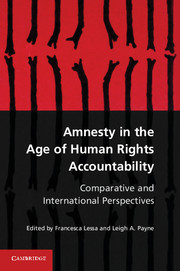Book contents
- Frontmatter
- Contents
- Contributors
- Foreword
- Acknowledgments
- Introduction
- Part I Theoretical Framework
- Part II Comparative Case Studies
- 3 Amnesties’ Challenge to the Global Accountability Norm?
- 4 From Amnesty to Accountability
- 5 Barriers to Justice
- 6 Resistance to Change
- 7 De Facto and De Jure Amnesty Laws
- 8 Creeks of Justice
- 9 Accountability through Conditional Amnesty
- 10 De Facto Amnesty?
- 11 A Limited Amnesty?
- 12 The Spanish Amnesty Law of 1977 in Comparative Perspective
- Conclusion Amnesty in the Age of Accountability
- Bibliography
- Index
- References
7 - De Facto and De Jure Amnesty Laws
The Central American Case
Published online by Cambridge University Press: 05 June 2012
- Frontmatter
- Contents
- Contributors
- Foreword
- Acknowledgments
- Introduction
- Part I Theoretical Framework
- Part II Comparative Case Studies
- 3 Amnesties’ Challenge to the Global Accountability Norm?
- 4 From Amnesty to Accountability
- 5 Barriers to Justice
- 6 Resistance to Change
- 7 De Facto and De Jure Amnesty Laws
- 8 Creeks of Justice
- 9 Accountability through Conditional Amnesty
- 10 De Facto Amnesty?
- 11 A Limited Amnesty?
- 12 The Spanish Amnesty Law of 1977 in Comparative Perspective
- Conclusion Amnesty in the Age of Accountability
- Bibliography
- Index
- References
Summary
At the beginning of this volume, Kathryn Sikkink argues that the justice cascade is the product of separate streams that converge to form an international norm of accountability. She points out that there is a particularly “strong accountability stream” coming from Latin America, focused on domestic prosecutions for past human rights violations. While there is undeniable evidence of numerous criminal prosecutions in the Southern Cone of Latin America, particularly in Chile and Argentina (see Par Engstrom and Gabriel Pereira’s chapter on Argentina in this volume), the case of Central America is not so clear cut. It represents an example within the region where accountability streams have not yet succeeded in cascading or washing away persistent cultures of impunity. Central America thus points to the limitations of the justice cascade.
To examine the limited ability of the international accountability norm embodied in the justice cascade to permeate domestic legal systems, this chapter considers the cases of Guatemala and El Salvador. Despite significant anti-impunity rulings, recommendations of official investigatory commissions, and decisions issued by UN human rights bodies, the IACHR, and the IACtHR, amnesty laws in both countries remain on the books, although they are applied in different ways. However, it is not the existence of an amnesty law per se that perpetuates impunity, but rather the lack of political will to prosecute and the existence of threats, corruption, and a climate of fear that have made it difficult to hold the powerful accountable for past (or present) violations. The international cascade toward individual criminal prosecutions has been more of an inconsistent trickle within the political and legal spheres of El Salvador and Guatemala. Only in 2011, almost thirty years after the worst of the human rights violations, did the trickle toward accountability accelerate in Guatemala, although it is not clear if this will dry up before it becomes a consolidated cascade. In El Salvador, impunity still seems impervious to trickles, streams, and cascades, although some evidence of change may be seen.
- Type
- Chapter
- Information
- Amnesty in the Age of Human Rights AccountabilityComparative and International Perspectives, pp. 182 - 209Publisher: Cambridge University PressPrint publication year: 2012
References
- 1
- Cited by



